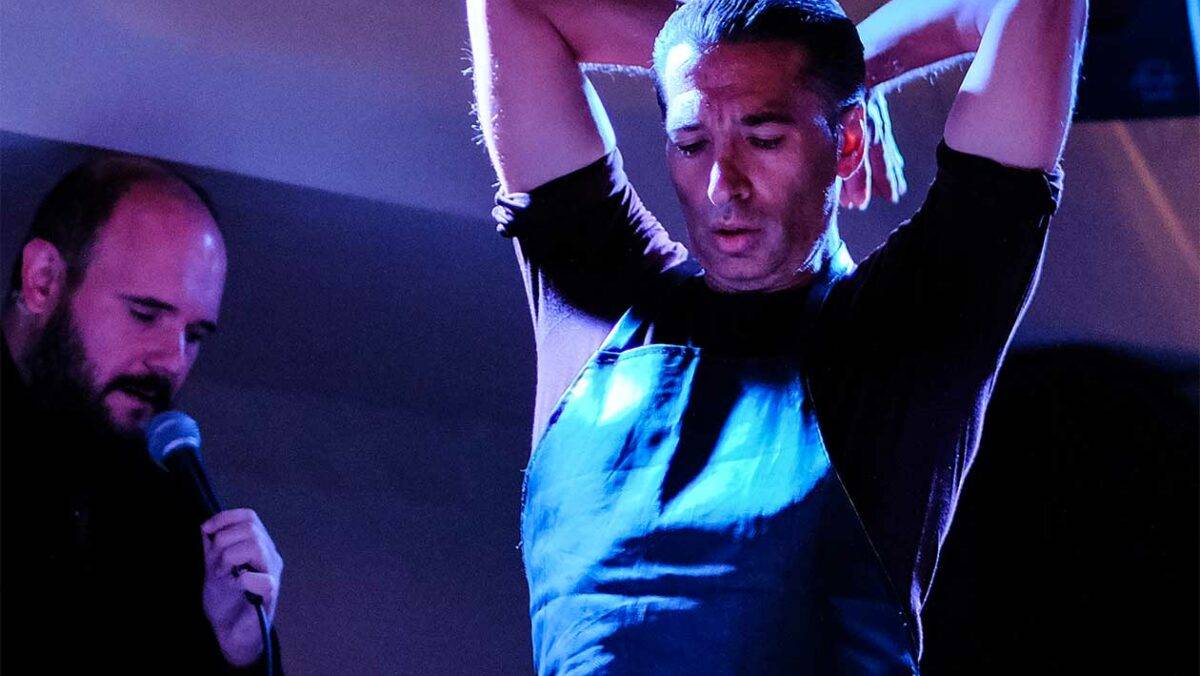CRÍTIQUES

VALORACIÓ
8
Fluttering on the fringe
Publicat el: 18 d'octubre de 2022
CRÍTiCA: Mellizo doble
In this mysterious yet tantalising flamenco-based piece, somehow nothing seems important, yet everything seems important. “Dadaesque” as one much more informed commentator observes, “no hay ni guión, ni contexto, solo una sucesión de escenas” (there’s no script, no context, just a series of scenes). The piece is probably named after Enrique el Mellizo, a famous flamenco singer of the late 19th century; the son of a slaughterman and mellizo (twin), he inherited his father’s nickname. And perhaps inheritance is key here? What we learn, what we abandon, what we retrieve and what is lost, as matured innovation grapples with aged tradition.
Mellizo doble (Double twin) brings together two superstars, Seville-born flamenco dancer Israel Galván (1973) and Valencia-born flamenco singer Francisco Contreras Molina, aka Niño de Elche (1985). These two insatiably curious artists, each with their devoted publics, span their near-generational gap with notable ease.
Twenty-five years ago, Galván caused controversy with his tradition-attacking ¡Mira! /Los Zapatos Rojos, an interpretation of the tragic story of Félix Fernández García, a flamenco dancer utilised and then abandoned by Sergei Diaghilev, the unflinching force behind the Ballet Russes. García ended his days dancing himself to death in an English mental asylum. In the 1998 piece, that worrisome legend was blended with the gruesome Hans Christian Anderson tale of The Red Shoes, about a girl punished for the offence of wearing red shoes to church, with a curse that doomed her to dance forever, even beyond the amputation of her feet. If innovation means amputation, then Galván might be searching for his feet again… Or at least, what remains when the feet are chopped off.
If ¡Mira! flung itself into the moral diabolical, then Mellizo digs into the mechanics of flamenco. As researcher and dramaturg Salvador S. Sánchez says, “Flamenco is a machine for the emotions. While for the viewer it seems spontaneous, it is entirely mechanical, complex and controlled.” The aim of this piece, Sánchez suggests, is to strip away the skin of flamenco to show its inner workings. There are also its ‘machines’ in the sense of its tools, new and old, its liturgical origins of the past, and its electronic loans of the present.
Galván took on the innovations of a surge of flamenco stars from the 1970s on, who theatricalised the art and introduced a shift in perspective. As choreographer Juan Carlos Lérida points out, formation in flamenco remained strictly disciplined while the art evolved, adopting some of the ways of contemporary dance, renewing its focus on personal identity and the individual body of the dancer rather than the conformity of group performance.
Back then, innovative work could not help but end with a splash. Today, anything brilliant easily scatters to the winds, with a public voracious for constant stimulation. Symbolism is lost in speed, or when recognised quickly becomes insignificant, like the mini rose Galván pins to his hair, the tiny muleta (the stick with the red cloth hanging off it, used in bull flighting) left to flutter to the floor. Does Galván lament his role in the dissolution of what once had passion and meaning, now drowned in a confetti of contemporary irreverence?
Niño de Elche is very much an artist of today, although his point of reference was the cantor Enrique Morente, hugely experimental without ever losing touch with his discipline. And today, El Niño packs concert halls with his versatile voice and his addictive brand of vulnerable flamenco that plays on a command over his art, fusing with jazz or electronic music, or engaging in collaborations with video, poetry as well as dance. It too honours the heritage of the 1970s, when anyone who was anyone seemed uncomfortable in the comfort zone. “Art permits me to submerge myself in contradictions and paradoxes and from there generate new realities” he says, “more than anti-flamenco, I’m ex-flamenco.”
CRÍTIQUES RELACIONADES / Mellizo doble
TÍTOL CRÍTiCA: Israel Galván i El Niño de Elche: creativitat infinita
PER: Júlia Vernet Gaudes

VALORACiÓ
9
TÍTOL CRÍTiCA: Talent bessó flamenc
PER: Jordi Bordes

VALORACiÓ
8

